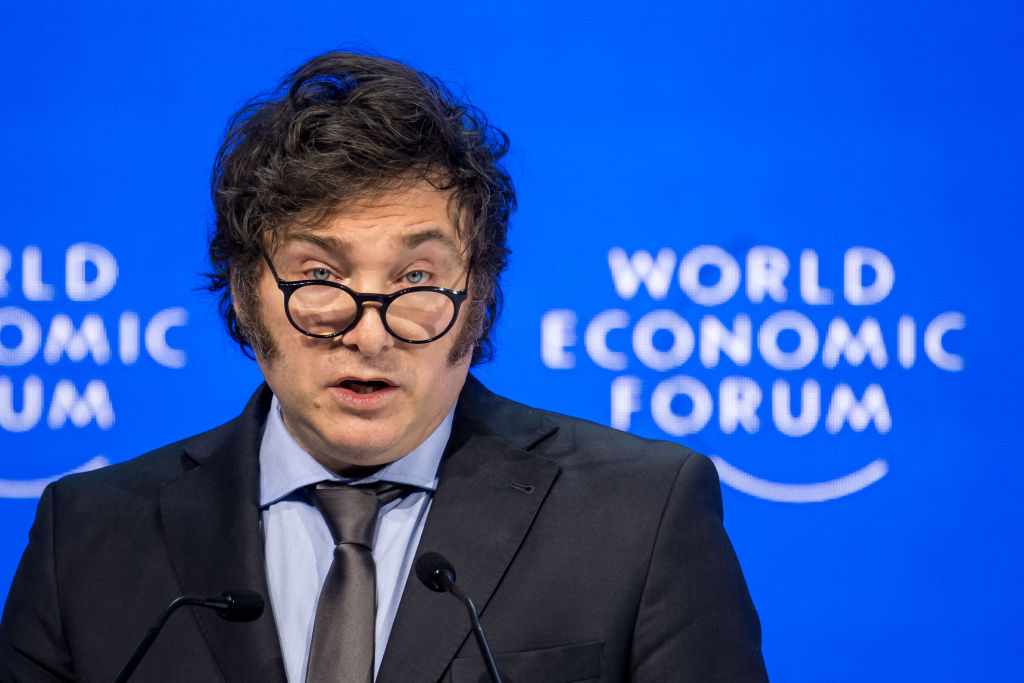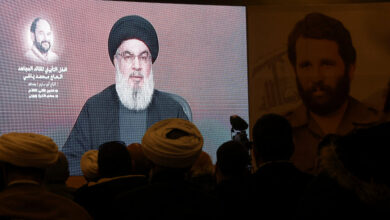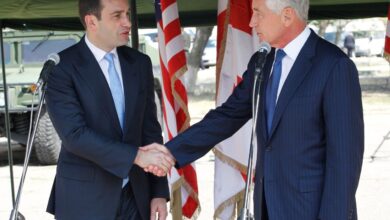
Javier Milei is Splurging on the Army
Javier Milei is splurging on the army – that’s the headline grabbing everyone’s attention in Argentina right now. His proposed military spending increases are astronomical, sparking intense debate about economic priorities, national security, and the very future of the country. Is this a necessary investment in defense, or a reckless gamble with the nation’s finances? Let’s dive into the details and explore the various perspectives surrounding this controversial issue.
Milei’s justification centers on bolstering Argentina’s national security and modernizing its outdated military equipment. He argues that increased defense spending is vital in a volatile geopolitical climate. However, critics point to the potential economic fallout – increased inflation, crippling debt, and a diversion of funds from crucial social programs. The comparison to past budgets and those of neighboring countries reveals just how significant this proposed surge in military spending truly is.
We’ll analyze the potential impact on various sectors, from personnel to equipment modernization, examining both the promised benefits and the potential downsides.
Javier Milei’s Military Spending Proposals

Javier Milei, during his presidential campaign in Argentina, advocated for significant increases in military spending. His proposals, often framed within a broader context of economic liberalization and a smaller state, sparked considerable debate and scrutiny. Understanding the specifics of his plans requires examining his justifications, comparing them to historical spending, and analyzing their potential impact on various military sectors.
Milei’s Justifications for Increased Military Spending
Milei’s rationale for bolstering the military budget centered on several key arguments. He emphasized the need to modernize Argentina’s aging military equipment, arguing that the current state of the armed forces was inadequate to meet contemporary security challenges. He also highlighted the importance of strengthening national defense capabilities, particularly in the context of regional geopolitical dynamics and potential threats. Furthermore, he suggested that increased military spending could stimulate economic growth through job creation in the defense industry and related sectors.
These justifications, however, were often met with skepticism given the country’s ongoing economic struggles and competing priorities for public funds.
Comparison of Milei’s Proposed Budget to Previous Budgets and Neighboring Countries
Precise figures for Milei’s proposed military budget varied across different statements and campaign materials, making direct comparison challenging. However, his proposals generally indicated a substantial increase compared to Argentina’s historical military spending. This increase would likely place Argentina’s military budget closer to, or potentially exceeding, that of some neighboring countries in South America, although specific data requires detailed analysis of official government budget documents and Milei’s campaign pronouncements.
A comparative analysis would need to consider factors such as GDP, population size, and specific geopolitical threats faced by each nation to provide a meaningful context. For instance, Brazil, with its larger economy and population, naturally maintains a larger military budget than Argentina, regardless of Milei’s proposals.
Proposed Military Spending Allocation Across Sectors
While detailed breakdowns of Milei’s proposed allocation across different military sectors were not consistently provided, a hypothetical allocation based on his stated priorities can be presented. This hypothetical breakdown should be considered an illustrative example and not a precise representation of Milei’s actual plans.
| Sector | Proposed Percentage of Budget | Justification | Potential Impact |
|---|---|---|---|
| Personnel | 25% | Maintaining and potentially expanding the size of the armed forces, focusing on improved training and recruitment. | Improved troop readiness and morale, but potential strain on national budget. |
| Equipment Modernization | 45% | Acquiring modern weaponry, aircraft, and naval vessels to enhance operational capabilities. | Improved defense capabilities, but potentially high upfront costs and reliance on foreign suppliers. |
| Infrastructure Development | 15% | Upgrading military bases, communication systems, and logistical infrastructure. | Enhanced operational efficiency and readiness, but long-term investment with delayed returns. |
| Research and Development | 15% | Investing in indigenous defense technology and innovation. | Long-term benefits of technological self-reliance, but requires substantial expertise and funding. |
Economic Implications of Increased Military Spending
Javier Milei’s proposed significant increase in Argentina’s military budget raises serious questions about its economic consequences. While bolstering national defense is a legitimate concern, the potential impact on the nation’s already fragile economy demands careful consideration. The allocation of substantial resources to the military inevitably diverts funds from other crucial sectors, creating a complex interplay of benefits and drawbacks.
Impact on Argentina’s Overall Economy, Javier milei is splurging on the army
A substantial increase in military spending would likely exert considerable pressure on Argentina’s overall economic performance. The immediate effect would be a larger budget deficit, potentially exacerbating existing inflationary pressures. This is because increased military expenditure would compete for resources with other essential sectors like education, healthcare, and infrastructure. Reduced investment in these areas could hinder long-term economic growth and worsen social inequalities.
Furthermore, a larger budget deficit could lead to increased borrowing, potentially driving up interest rates and further squeezing the economy. The allocation of resources towards the military, rather than towards productive investments, could also reduce overall economic efficiency. This means the country might not be getting the best possible return on its investment.
Opportunity Cost of Increased Military Spending
The opportunity cost of increased military spending is substantial. Every peso allocated to the military is a peso that cannot be invested in education, healthcare, infrastructure development, or social programs. For example, funding for crucial infrastructure projects like road repairs or improvements to the national power grid might be reduced, hampering economic activity and hindering long-term growth. Similarly, cuts to education budgets could negatively impact human capital development, leaving Argentina less competitive in the global market.
Reduced funding for healthcare could exacerbate existing health problems, leading to lower productivity and increased social costs. This highlights the trade-off between short-term security priorities and long-term economic prosperity.
Effects on Inflation, Debt, and Foreign Investment
Increased military spending can fuel inflation through several mechanisms. Firstly, the increased demand for goods and services related to the military could drive up prices. Secondly, a larger budget deficit could lead to increased money printing, further fueling inflation. The resulting higher inflation could erode purchasing power and damage consumer confidence. Moreover, the increased debt associated with financing the larger military budget could negatively impact Argentina’s credit rating, making it more expensive to borrow money in the future.
This could deter foreign investment, as investors might be wary of the increased risk associated with investing in a country with a growing debt burden and high inflation. The combination of high inflation and increased debt could create a vicious cycle, hindering economic growth and stability.
Examples from Other Countries
Several countries have experienced economic difficulties following significant increases in military spending. The Soviet Union during the Cold War, for example, dedicated a massive portion of its GDP to military buildup, ultimately contributing to its economic stagnation and eventual collapse. While not a direct parallel, the experience offers a cautionary tale of the potential long-term consequences of prioritizing military spending over economic development.
Similarly, some developing nations have diverted resources to military modernization at the expense of essential social services, leading to social unrest and economic instability. These examples underscore the importance of balancing national security priorities with the need for sustainable economic growth and social development.
Public Opinion and Political Reactions: Javier Milei Is Splurging On The Army
Javier Milei’s proposals for significantly increased military spending have sparked a heated debate in Argentina, dividing public opinion and provoking strong reactions from political rivals. The proposals, while popular among some segments of the population, have been met with skepticism and outright opposition from others, creating a complex political landscape. Understanding these diverse viewpoints is crucial to comprehending the potential impact of Milei’s plans.Public opinion is far from monolithic.
Javier Milei’s military spending spree is raising eyebrows, especially considering the global shifts in power. It makes you wonder about alternative priorities; for instance, while Milei focuses on bolstering his army, check out this article on how India has a unique opportunity to lead in AI , a field that could offer far greater long-term strategic advantage.
Ultimately, Milei’s choices will define Argentina’s future, and whether it will thrive or fall behind in a rapidly changing world.
Support for increased military spending tends to be higher among those who favor a strong national defense and a more assertive foreign policy. These individuals often view the current state of the armed forces as inadequate and believe that increased investment is necessary to protect Argentina’s national interests. Conversely, many Argentinians are deeply concerned about the economic implications of diverting significant resources to the military, particularly given the country’s ongoing struggles with poverty and inflation.
They argue that the funds could be better allocated to essential social programs such as healthcare, education, and infrastructure. This opposition is particularly strong among left-leaning groups and those who prioritize social welfare. Polling data reflecting these divergent opinions is unfortunately scarce and often lacks the necessary detail to fully capture the nuances of public sentiment.
Javier Milei’s massive military spending is raising eyebrows, especially considering the current economic climate. It makes you wonder about the priorities of certain leaders, especially when contrasted with the news that a Dem senator is facing a bar complaint – check out this article dem senator hit with bar complaint for openly threatening supreme court – for openly threatening the Supreme Court.
Such actions highlight the diverse ways power can be wielded, and the differing focuses of political leaders like Milei, whose army spending continues to be a major point of contention.
Reactions of Other Political Parties and Figures
Milei’s proposals have been met with a range of responses from other political actors. His main opponents, from the Peronist and Radical Civic Union parties, have largely criticized the plans, citing concerns about the economic burden and potential for misuse of funds. Some have accused Milei of prioritizing military spending over essential social services, highlighting the opportunity cost of such a significant budgetary shift.
Others have questioned the strategic rationale behind the proposed increases, suggesting that the funds could be better utilized to address other pressing national security challenges. Conversely, some smaller, more right-leaning parties have expressed support, aligning with Milei’s nationalist rhetoric and emphasis on strengthening the armed forces. The debate has highlighted deep ideological divisions within the Argentine political spectrum regarding the role of the military and the allocation of national resources.
Javier Milei’s military spending spree is raising eyebrows, especially considering the instability in the region. It’s hard to ignore the parallel with Bolivia’s struggles, as highlighted in this sobering article about Bolivia’s slow-motion economic crisis is accelerating. Such drastic economic shifts make one wonder if Milei’s prioritization of the army is truly the best use of Argentina’s resources right now.
Potential Political Consequences of Proposed Increases
The political consequences of Milei’s proposed military spending increases are potentially significant and far-reaching. Increased spending could alienate voters who prioritize social welfare and economic stability, potentially harming his electoral prospects in future elections. Conversely, it could solidify his support base among those who favor a strong military and a more assertive national posture. The debate surrounding military spending could also reshape the political landscape, potentially leading to realignments within existing parties and the emergence of new political forces.
The outcome will depend on a number of factors, including the overall economic climate, the effectiveness of Milei’s communication strategy, and the responses of his political opponents. A significant increase in military spending, especially if implemented without careful planning and oversight, could also lead to public unrest and social instability.
Arguments For and Against Increased Military Spending
The debate surrounding Milei’s proposals highlights fundamental disagreements about the role of the military and the allocation of national resources.
The following points summarize the arguments for and against increased military spending:
- Arguments For:
- Strengthened national defense and security: Increased funding allows for modernization of equipment, improved training, and enhanced capabilities to protect national interests.
- Enhanced regional influence: A stronger military can project power and influence in the region, potentially improving Argentina’s diplomatic standing.
- Job creation and economic stimulus: Military spending can stimulate economic activity through procurement contracts and related industries.
- Arguments Against:
- Economic burden: Significant increases in military spending divert resources from crucial social programs, potentially exacerbating existing inequalities.
- Risk of corruption and mismanagement: Large-scale military spending increases the risk of corruption and inefficient use of public funds.
- Escalation of regional tensions: Increased military spending could trigger an arms race with neighboring countries, leading to increased regional instability.
Geopolitical Context and National Security
Javier Milei’s proposed military spending surge must be understood within the complex geopolitical landscape of South America and Argentina’s specific regional and international relationships. His proposals are not made in a vacuum but are a response to perceived threats and opportunities, reflecting a distinct ideological perspective on national security.Argentina’s geopolitical position is characterized by a history of regional rivalries, fluctuating economic partnerships, and a complex relationship with its larger neighbors, particularly Brazil.
Internally, economic instability and social unrest contribute to a sense of vulnerability, making national security a potent political issue. Milei’s proposals tap into these anxieties, promising a stronger, more assertive Argentina on the world stage.
Potential Threats to Argentina’s National Security Addressed by Milei’s Proposals
Milei’s proposals likely aim to address several perceived threats. These include potential instability in neighboring countries, impacting Argentina’s security through migration flows, drug trafficking, or cross-border crime. Furthermore, the proposals may be framed as a response to perceived threats to Argentina’s maritime claims in the South Atlantic, particularly concerning the Falkland Islands/Islas Malvinas dispute with the United Kingdom.
Finally, economic instability and the potential for internal unrest are also national security concerns that a strengthened military could, in Milei’s view, help mitigate. The underlying assumption is that a robust military presence enhances national sovereignty and deters potential aggression or internal instability.
Impact of Milei’s Proposals on Argentina’s International Relations
The potential impact on Argentina’s international relationships is multifaceted and potentially disruptive. Increased military spending could strain already tight budgets, potentially impacting other crucial areas like social programs and infrastructure development. This could lead to criticism from international organizations and donor countries. Furthermore, a more assertive military posture could be perceived negatively by neighboring countries, potentially escalating regional tensions.
Conversely, a demonstrably stronger military could enhance Argentina’s negotiating power in regional disputes, particularly concerning the Falklands/Malvinas. The success of this strategy hinges on the careful management of diplomatic relations and the avoidance of aggressive posturing.
Hypothetical Scenario: Implementation of Milei’s Plan
Let’s imagine a scenario where Milei’s proposals are fully implemented. In a positive outcome, Argentina experiences a boost in national pride and a perceived increase in regional influence. Improved defense capabilities could lead to more effective border control, reducing cross-border crime and illegal activities. This scenario, however, depends on a strategic allocation of resources and a diplomatic approach that mitigates potential negative reactions from other countries.
A successful negotiation with the UK regarding the Falklands/Malvinas, facilitated by Argentina’s increased military strength, would be a significant positive outcome.Conversely, a negative outcome could involve increased regional tensions due to a perceived aggressive stance by Argentina. This could lead to arms races with neighboring countries, diverting resources away from vital social and economic programs. International isolation due to strained relations with key trading partners could cripple the Argentine economy, exacerbating existing social and political instability.
A failed military operation related to the Falklands/Malvinas, for example, would further undermine Argentina’s international standing and domestic political stability. The success or failure of Milei’s plan will significantly depend on the strategic context in which it is implemented and the subsequent diplomatic maneuvering.
Transparency and Accountability in Military Spending

Argentina’s current mechanisms for overseeing military spending are complex and often criticized for lacking transparency. The National Congress approves the annual budget, but oversight relies heavily on existing governmental bodies, which have been subject to accusations of inefficiency and a lack of independent auditing. Public access to detailed spending information is limited, hindering effective scrutiny. This lack of transparency contributes to a climate where potential for corruption and misuse of funds is a significant concern.
Current Mechanisms for Transparency and Accountability
The Argentine government utilizes several bodies to oversee military spending. The National Congress, through its budget committees, reviews and approves the military budget. However, the level of detail provided and the independence of the review process have been frequently questioned. The Auditor General of the Nation is responsible for auditing government spending, including that of the military, but its capacity and effectiveness are often debated.
Additionally, various legislative commissions can investigate specific aspects of military expenditure. However, these mechanisms often lack the resources and authority to fully investigate complex financial transactions. The effectiveness of these existing mechanisms is hampered by a lack of robust data availability, independent analysis, and public access to information.
Milei’s Proposals and Transparency
Javier Milei’s proposals for increased military spending haven’t, to date, included detailed plans for enhanced transparency and accountability measures. While he advocates for a more efficient and streamlined military, the specifics of how this efficiency would be monitored and the transparency of the process remain unclear. His emphasis on reducing the size and scope of the state could, potentially, lead to a reduction in oversight bodies, raising concerns about the potential for less accountability.
The absence of explicit commitments to strengthening independent auditing and public access to financial data is a significant gap in his proposals.
Potential for Corruption Under Milei’s Plan
The potential for corruption and misuse of funds under Milei’s plan is a significant concern, particularly given the lack of detailed proposals regarding transparency and accountability. Increased military spending, without robust oversight mechanisms, creates a fertile ground for corruption. The concentration of power and the potential weakening of existing oversight institutions, as suggested by some interpretations of his platform, could exacerbate this risk.
Historical examples in other countries show that rapid increases in military spending without parallel increases in transparency and accountability often lead to significant corruption scandals. Argentina’s history of corruption further intensifies these concerns.
Illustrative Flow of Funds Under a Hypothetical Milei Administration
Imagine a simplified flow: The National Congress approves a significantly increased military budget (let’s say a 50% increase). This budget, lacking detailed line-item specifics due to a potential prioritization of streamlined budgeting, is then channeled to the Ministry of Defence. The Ministry allocates funds to different branches of the military based on its own priorities. Internal oversight within the Ministry, potentially reduced under Milei’s proposed leaner government, would then monitor spending.
However, given the lack of strong external oversight mechanisms emphasized in Milei’s platform, there is a higher risk of funds being misallocated or misused without adequate detection or accountability. Any auditing would rely heavily on the internal systems of the Ministry and the capacity of a potentially weakened Auditor General’s office. This structure presents a higher risk of opaque transactions and a lack of public access to information regarding the actual use of these funds.
So, is Javier Milei’s military spending spree a bold stroke of genius or a dangerous gamble? The answer, like the situation itself, is complex. While strengthening national security is undeniably important, the potential economic consequences cannot be ignored. Public opinion remains deeply divided, with passionate arguments on both sides. Ultimately, the success or failure of this plan will depend on careful management, transparency, and accountability – aspects that deserve intense scrutiny.
The coming months will be crucial in determining whether this ambitious plan strengthens Argentina or weakens it.




